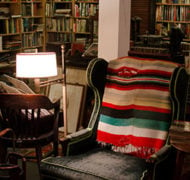Taking a Rest From Knowing It All
Blog / Produced by The High Calling
No matter how old you are, most people in modern society are connected to the internet. As a result, at home, at work, or in our pocket, we have tremendous access to information that seemingly is without end.
Need to check on a bus schedule, an obscure cultural reference, or a famous quote? It’s right there. Need a recipe using round steak, a book for a sick coworker, or a Bible verse for a child struggling with anger? Just open, type and click.
Just think what search engines have done for us. Vast sums of information are now available to us in mere microseconds.
Mankind has always had a need and a desire for information. The accumulation of knowledge has been a quest for millennia. The oldest organized library in history was built in Syria – going back to 2,500 B.C. The Royal Library of Alexandria in Egypt impressed visitors in the 3rd century B.C., accumulating 400,000 manuscripts from the around the world. The modern Library of Congress was started with the personal collection of Thomas Jefferson and has grown to 838 miles of bookshelf space.
Today, thanks to algorithms, super computers, and the proliferation of personal computers and devices, you can find information on nearly any subject from anywhere. It’s not comprehensive, and it’s certainly not always accurate, but having that kind of access to information makes us feel smart.
But all of this access to knowledge really hasn’t made society any smarter. We’re still blundering down the same paths of destruction. The mere ability to call up information does little to showcase human intelligence. We still make the same mistakes. And an over-reliance on instant information short-circuits the brain’s cognitive and reasoning power. This can’t be good for the human race.
Personally, I have found the access to so much knowledge to be limiting. For example, how many of us, when we are sick, search for causes and treatments on the Internet? It’s easy for a simple upset stomach to morph into food poisoning or a disease from the deadly Ghantu worm thanks to “helpful” searches. I’m certainly no wiser—or healthier—just because I can search for an answer.
I can read about the history of love, the nuances of the word in different languages, and the top 10 best love quotes, but none of that makes me an expert on the subject. I can search for “How to Find Hope,” and have 78 million results in .15 seconds. But all that access to knowledge and information doesn’t do a thing for an empty heart. All the opinions in the world won’t keep me from making foolish choices.
Wouldn’t it be better to search for answers from God, instead of Google? What if I relied less on information and focused more on discovery which leads to wisdom.
I’m starting to revolt against the ability to act like a know-it-all. We’re planning to vacation along the California coast. I’m trying to resist searching for the best restaurants, the best beaches, and the fastest route. What if we simply meandered? What if we talked to other tourists and locals about their experiences? What if we just “traipsed”?
Would that be so bad?
Image by Rares Dutu. Used with permission. Sourced via Flickr. Post by High Calling Newsletter Editor, David Rupert.
EDITOR'S NOTE: On Thursday mornings in August, we are exploring rest, what it means to quiet our minds, our bodies, our spirits. Whether we set a side a full day's Sabbath or just a moment of silence, our homes, workplaces, communities, and churches all benefit when we take time to stop. Join us each week to tell us your stories of finding rest in the busyness of life.
Posts on rest:
- Resting My Mind by Dena Dyer
- Silence: Resting from Life's Noise by Dan King
- Resting in the Nap Zone by Cheryl Smith
- Taking a Rest from Knowing It All by David Rupert
- The High Calling of Rest by Charity Singleton Craig





